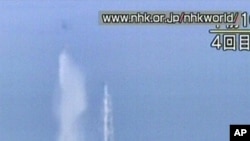The threat of a nuclear meltdown at the Fukushima power plant in Japan is causing anxiety about the safety of nuclear power plants worldwide.
Fifty workers are the only ones left, essential employees permitted inside Japan's Fukushima power plant. And even they have evacuated the facility several times when radiation levels spiked. The crisis is causing worldwide repercussions.
Germany has taken its oldest seven reactors off line for three months. It will then decide whether to extend the lives of the plants. German Chancellor Angela Merkel. "In the light of this situation, we will proceed with a security check of all our nuclear plants," she said.
Fanny Zierle lives near one of those plants. "I certainly do have my worries, but I do not have sleepless nights. Those who have invented this technology should have sleepless nights," she said.
The European Union is conducting stress tests on 143 nuclear plants to see how they would withstand shocks.
The head of the International Atomic Energy Agency, Yukio Amano, is worried. "The situation is very serious," he said.
China is strengthening its radiation checks even though winds from Japan are expected to carry radiation away from China, into the Pacific.
Authorities in Taiwan plan to stage nuclear disaster drills near three nuclear power plants. Parliament wants to stop construction of a fourth plant. President Ma Ying-jeou says faced with disaster, Taiwan would give up its reactors to save its people. "If it is impossible to rescue the situation, we must sacrifice," he said.
In the United States, Energy Secretary Steven Chu says the American people can have "full confidence" in the country's nuclear power plants even though some plant designs are similar to those in Japan.
"We’re going to look at what went wrong in terms of double barrel whammy - of this huge, huge earthquake and huge tsunami and look to our reactors again and learn as much as we can so we can, if needed, improve the safety," she said.
Robert Alvarez, with the Institute for Policy Studies, says this is the end to any resurgence in the nuclear industry. "Overall you have a slamming of the breaks going on, and while people might be giving reassurances and rhetoric about their support for nuclear power, I don’t think you should be deluded into thinking they’re not having second thoughts worldwide about the viability of nuclear power and the safety of the existing reactor fleet around world," she said.
Especially, when some of the world's nuclear plants, like the one at Fukushima, are in earthquake zones.
World Leaders Review Nuclear Policies












